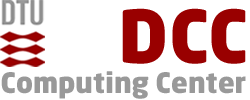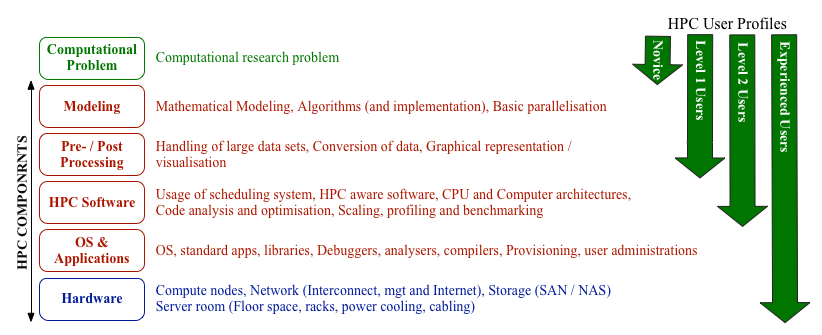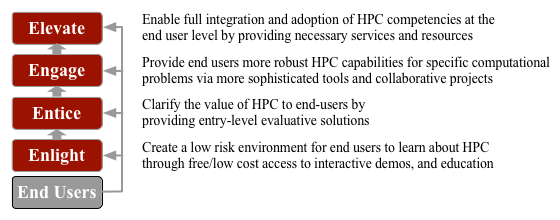In DTU HPC Competence Center we regard the use large computational resources (HPC) for modelling and simulation an increasingly important practical and strategic tool to reach solutions fast, or even break new grounds. HPC is required for an increasingly wide range of disciplines within academia and industry to remain competitive and boost innovation. This constitutes HPC as a virtual laboratory of great importance to many, and should thus be easily accessible and usable to many. This is what we aim to enable in DCC.
Accordingly, our strategy revolves around continuously gathering and establishing broad and deep HPC knowledge and disseminate this to novice as well as experienced HPC users. Primarily within DTU but also to other universities, public institutions, and industry. To accomplish this, the HPC Competence Center has strong networks and is in close contact with its most relevant stakeholders – namely HPC users and other HPC experts. In order to gather disseminate HPC knowledge from the many and strong HPC competencies and experiences across DTU and other places DCC operates by the below illustrated overall model.
As the model in the above figure illustrates DCC main customer segment is universities, with DTU as the primary. However, the objective is to also serve other universities and public institutions through the Danish e-Infrastructure Cooperation (DeIC). Our last and smallest customer segment is companies, where access to HPC infrastructures as well as competencies can be provided on consultant basis or as part of a research project. The dotted green arrows illustrates the flow of end users. The purpose of this user flow, where the competence center is in dialogue with as many users as possible, is to gather as much knowledge about HPC usage as possible is order to be able to best possibly disseminate the use of HPC. This illustrations fits best for new HPC users as many experienced users probably readily will know where to go or already is using HPC at a specific site. Good and strong relations with other HPC operations centers are needed for the above model to work. In particularly for other DTU Operations Centers. The reason for this is twofold:
- Firstly, in order to get to know the profiles of the different HPC installations at other sites and how to get users on these systems, and the terms for this.
- Secondly to gather the knowledge and experiences from these sites for HPC knowledge dissemination.
In the HPC Competence Center we regard HPC as constituted by the components presented in the figure below, which also illustrates the four different user categories the HPC Competence Center operates with. DCC is equally willing and capable of serving all four categories. As dissemination of HPC is one of our main purposes we will focus our active search for new customers within novice users. Our assumption is also that it those whom will shed most new light on HPC usage and hereby for us the biggest source of new knowledge on HPC usage. This should not be understood so that competence center can not learn from experienced users. We definitely can, but that will be learning about deepening our existing HPC knowledge rather than widening it.
Being a HPC Competence Center implies being capable of providing more value than “just” HPC operations. The HPC Competence Center entails higher level knowledge – following the layered levels of the above figure – on which computational problems to apply to HPC and how. With regards to the above figure this means that staff in the competence center is constituted not only by specialized HPC system administrators – typically with an perspective of understanding from bottom up in the HPC components of the above figure – but also so called HPC specialists with an perspective of HPC understanding going from top down. Or in other words we are capable of approaching HPC from a technical perspective as well from the perspective of the computational problem. And our experience has shown that a gap often exits between those. In particular for end users coming from the perspective of the computational problem. It is, besides administrative practical matters, this gap that makes “distance and time” required for converting a computational problem to code being executed efficiently for a result very long, due to the amounts of knowledge, experience and contacts required to achieve this. The role of the HPC specialists is primarily to act as bridges between researchers and result (or the computational problem and hardware), which is why the requirements of those are a PhD grade, a year of experience with research within a field utilizing computational heavy problems. Doing this requires DCC to have strong competencies within understanding computational problems and being able to consult on choosing or optimizing algorithms and methods for solving the problem and implement the chosen method optimally in terms of choice of architecture and code. This is one of the main reasons of location the DTU HPC Competence Center at the Department of Applied Mathematics and Computer Science at DTU (DTU Compute) as this provides very strong hinterland to grab into if and when needed.
In our efforts to disseminate HPC usage we are working by a model as illustrated in the figure below.
Aiming to act as a stepping stone to new as well as experienced HPC users, the competence center has to be capable of taking users in at different levels as described in the figure.



